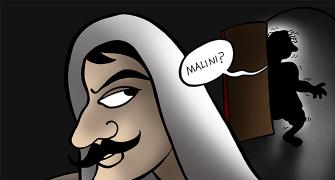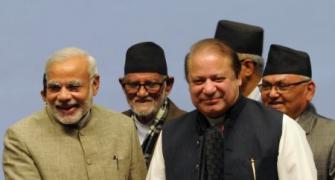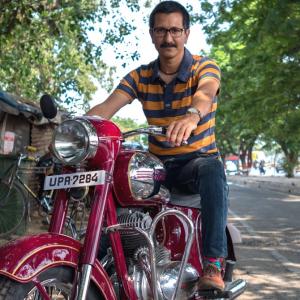![]() Over Dosas in Mumbai, Oscar winner Megan Mylan tells Vaihayasi Pande Daniel why she chose India and girl empowerment as the subject of her new documentary.
Over Dosas in Mumbai, Oscar winner Megan Mylan tells Vaihayasi Pande Daniel why she chose India and girl empowerment as the subject of her new documentary.
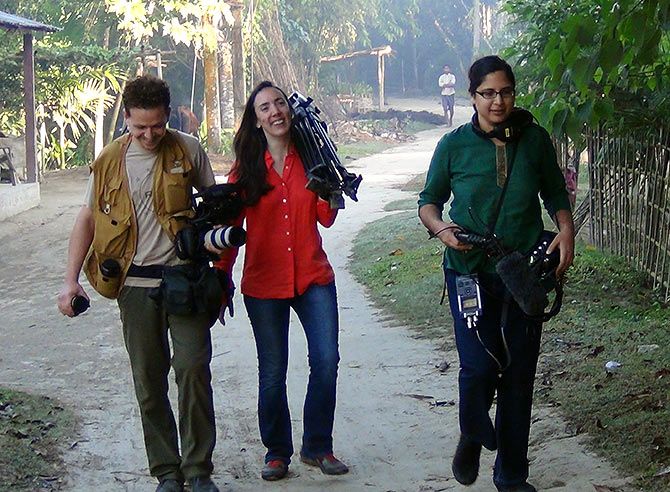
When Oscar-winning director Megan Mylan discovers a new subject for a documentary, she or he may not know it, but their life is about to change. Maybe forever.
After the success of Smile Pinki, with After My Garden Grows, Mylan has zoomed in on the life of a 16-year-old Rajbonshi tribal girl, tending a rooftop vegetable garden to fund her schooling, in dot-on-the-map Bhutkura, Cooch Behar district, West Bengal.
Monika Barman is one of three siblings.
Her father Kamal meagerly supports the family through farming and river/pond fishing, bringing home, in a good week, a little over Rs 200.
Monika's brother, Kanak is away in Bengaluru working as a construction labourer (earning about Rs 350).
Elder sister Kanika was married early for a dowry of Rs 20,000 ($320), had a tough pregnancy and a child at 16, and lives two hours away with her in-laws; her husband also labours in Bengaluru (earning about Rs 550 or $9 a day in construction).
When Mylan happened on this family last November, Monika's parents were actively looking for husbands for her. "Offers were coming in. They were talking about things like 'This guy eats well (indicating prosperity).' 'This guy has land.' She was out of school because she was unable to pay the fees," Mylan remembers.
It was Monika's garden income, and Kanika's strong stand that her younger sister should not be married early, that led to her being able to continue her education.
Mylan, in just 10 minutes through her documentary, follows this poignant tale of hope to its happy conclusion -- a small moment of victory for one teenager, who will not marry early, among the less-lucky 14 million worldwide who do. 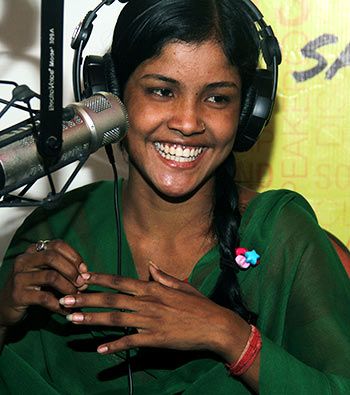 When the documentary was released in India November 14, Monika, who had never been as far as Bagdogra (the closest large town to her village; five hours away), travelled nervously by plane to New Delhi with her elder sister and nephew Akash.
When the documentary was released in India November 14, Monika, who had never been as far as Bagdogra (the closest large town to her village; five hours away), travelled nervously by plane to New Delhi with her elder sister and nephew Akash.
(Monika Barman gives a radio interview, left)
There the Barman girls -- both elegantly turned out for the occasion and armed with admirable sangfroid -- met Maneka Gandhi, India's minister for women and child development, to hand over a copy of the film with Mylan.
They then came to Mumbai to mingle with actors like Aamir Khan and Kangna Ranaut, among others of the Bollywood fraternity and stay at the five-star Sofitel hotel.
There was also a trip to a central suburb for South Indian food, which turned out to be a cultural misadventure, during which Monika stared suspiciously and unhappily at the strange looking Dosas, Dahi Rice and Tomato Pulau presented to her for dinner instead of the comforting Bhaat (plain rice).
Being part of the Kolkata International Film Festival brought the happiest surprise of all: A meeting with Bengali movie star Ranjit Mallick (Sathi, Interview, Guru Dakshina, Amader Songsar, Shatru, Mouchak).
For Monika, talking to celebs, run-ins with ministers or Aamir Khans, being feted by socialites (who chit-chatted about how they were doing their bit in helping the Monikas of this world: By hiring them as household help!), "air dashes" across India, fancy-schmantzy five-star hotels seemed pretty routine compared to the once-in-a-lifetime chance of posing with Mallick.
She was breathless with excitement.
Mylan shot a memorable frame of the yesteryear matinee idol and the new documentary star and it will likely go up on a wall of her home, a little piece of history.
"They have taken it totally in their stride," Mylan says.
"Their first plane ride was to Delhi with Suprio Chatterjee (who works with Landesa in West Bengal, the NGO helping implement the gardening program and who was Mylan's case translator and bridge to the local community). I flew with them on their second flight and they were like: 'Ya, ya, done it!' (Even at the airport) moving sidewalk it was just tuk-tuk-tuk (Mylan mimics a prancing movement). There's like a footbridge across the little stream in their village that I was nervous just walking on… If you even pause you are screwed… If they can do that they can do a moving sidewalk or escalator."
Back in Bhutkura, after the ten-day glee spree roaming India, where they were warmly welcome by many of the village, Monika's schedule is back to its ordinary rhythm -- early morning tending her garden, feeding the cows, helping her father fish, puja and assisting her mom Kalpana with housework, school (a short walk from the village) from 11 to 4 pm, evening puja, interspersed some days with trips to the market to sell her produce.
'I'm feeling so good to be back here,' Monika told Suprio and her parents were quite relieved to see them return safe.
There will be some life-altering changes, as well as challenges, in the days ahead for Monika and Kanika, rather different from visits to Bollywood or the people/places she briefly and superficially experienced when she left her village to discover the world beyond her now famous garden.
The showing of Mylan's documentary resulted in an endowment for Monika's education right through college from an Indian hotelier and for Kanika to start up her education again and eventually get a teaching degree (from an American woman who had been a single mother).
Says Mylan, "The girls were overwhelmed with someone wanting to invest in their futures… The people in my films give their stories so generously, I always make sure I do everything I can after the film is completed to see that they get some concrete benefit… As a filmmaker, I'm trying to get you to connect with my characters... I want the audience to be able to connect with the millions of Monikas and Pinkis that can benefit from their help."
When Mylan set out to make her first Indian film in 2008 on Pinki Sonkar, a five-year-old with a cleft lip, it was a voyage into the unknown.
On a shoe-string budget, she struggled to bring to screen a portrayal of the difficult journey of a child from rural Uttar Pradesh, whose trip to Varanasi to get her lip operated is a trip that fixes her life too.
Magically, it changed Mylan's life as well. She, Pinki and her father Rajendra Sonkar, the Smile Train surgeon who operated on Pinki, uncertainly walked the red carpet into the Kodak Theater February 2009 and came home with an Oscar for the Best Documentary. 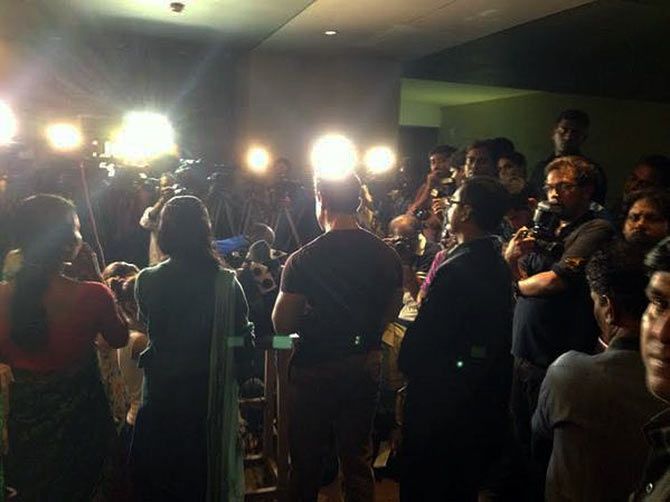
Now that Mylan, 45, has an Oscar sitting pretty in her New York apartment, locating backers for this latest documentary outing in India was less uphill.
"Yes, the Smile Pinki Oscar thing helped get conversations started with people…" she acknowledges.
First off, the Sundance Institute, in association with the Bill and Melinda Gates Foundation, reached out to her, asking her to make this film.
She and four other filmmakers, including The Lunchbox director Ritesh Batra, were invited to do 10-minute short films on any subject dealing with poverty or hunger anywhere in the world.
Mylan chose India and girls' empowerment: "Investing in girls is about the smartest thing you can do. Then I wanted to come back to India. I wanted an excuse to do something here again. That film brought such a warm embrace and such acceptance by Indian audiences. Before it was totally forgotten I wanted to cash in, in a social change kind of way… Wanted what people remembered of that film to generate audiences for a new story."
Various corporate sponsors and NGOs backed Mylan in her efforts to promote the film.
They realised the value of her films: Her telling of a "real fairy tale" in 600 seconds has the capacity to change a life or many lives.
She was supported, or her costs were underwritten, by sponsors ranging from The Kandeda Fund, the Landesa Rural Development Institute, PVR Cinemas, designer Sabyasachi to Shaadi.com, Taj Hotels, The Leela, Mahindra's Nanhikali and Jet Airways.
Homing in on Monika's story was not terribly tough.
Mylan was in touch with friends and colleagues at NGOs, asking for details of unusual young women empowerment projects. She sorted through what they were doing, looking for an intriguing narrative -- where smart assistance was transforming girls' lives, even marginally.
"There is so much good work happening around the country (India)," she says.
But the challenge was "to find something that felt interesting, you could tell well and in such a short amount of time, that would deal with the complexity of the issue, but not be so complex that it needed two hours plus kind of (telling)."
A friend working on child marriage causes alerted Mylan in July 2013 to the work the Sabla program was doing, in tandem with Landesa and anganwadis (a government program providing shelters to children), under government supervision.
The latter had added attraction, because while small NGOs often work "nimbly and creatively," highlighting a mass program had more value, even if it is a "delicate dance" to ensure it does not emerge looking like propaganda.
This project was teaching some 50,000 girls about property rights and organic gardening, and helping keep girls in West Bengal longer in school.
From there, accompanied by a social worker ("So, I am not a strange gal from New York showing up at the village") she was directed to Bhutkura.
Located about 30 minutes from Cooch Behar, and 20 minutes off the paved road, it was a pretty little place: "Very beautiful in that way that rural existence looks so romantic, if you don't have to actually live there. Lots of bicycles. A really vibrant agricultural (area). Lots of small landholders. You can see this huge pride in that land. Little houses altogether in compounds -- so a lot of freedom for aunties and neighbors to walk in and out. If you climb up on the roof (of Monika's home) you could see all the way to the other person's house. Great sense of community.
"Life was so simple there on one level. Simple in that your schedule is the schedule of the sun rising. And the harvest. You eat what your land can grow. There's no 'Shall we go for sushi tonight' or 'I am tired of that restaurant'… '(It's) this is ready to eat today. There was fish, we will have fish. There was no fish we will not have fish.' And 'Everyone I know and love for the most part is here with the exception of Brother who has gone away.' It is just very straightforward. And then on the other level they are dealing with soooo much -- all of the multi-level stuff that goes along with poverty, lack of education, lack of public health awareness."
Monika's family owns land the size of three parking spaces, describes Mylan, and every last millimetre is assiduously farmed.
Even the eaves were packed out, where pigeons were being reared.
Sessions at the local anganwadi had equipped Monika with some knowledge of farming and she was using her skills to farm the roof and a wee bed at the back of their cottage. 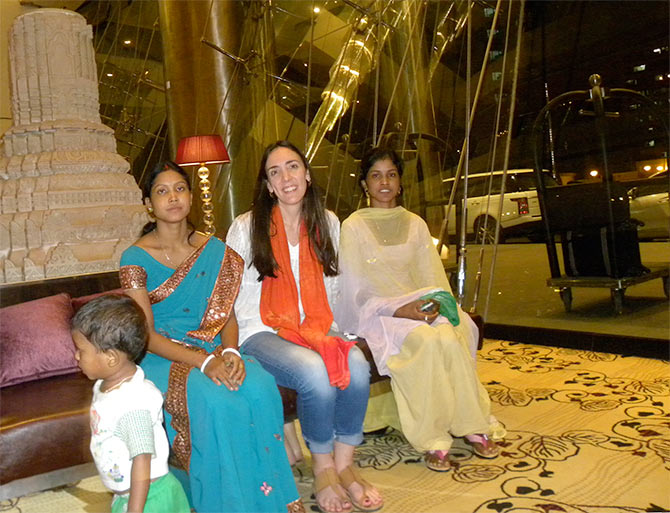
The first harvest brought a crop of handsome gourds that added to the family diet and fetched Monika a proud Rs 60 ($1) on her first market day, a sturdy sum compared to what her father ekes out.
Her bright green thumb and her new-found knowledge of women's rights (she learned that marriage below 18 years is illegal) changed the complexion of the talks of marriage happening at home.
"Monika has different expectations of her future. She wants more," Mylan says.
Along with Kanika, Monika's mom Kalpana also started advocating they wait before they marry off Monika. She had seen what happened when she married off one daughter at a young age and didn't want a repeat. Both wanted her to finish school.
Monika's father, who Mylan takes pain not to "demonise," has stopped looking at his younger daughter as someone he must protect, because she has started sharing the role of a provider with him.
He -- being a victim of too "long-held cultural norms" -- remains anxious about Monika's marriage because he knows the longer they wait the higher her bride price.
But he was persuaded to change his mind.
"The penny hadn't dropped when we finished filming a year ago. But a year later Monika is back in school. They are able to pay the fees and they are not looking at a husband for her anymore…
Everything doesn't get wrapped up in a neat bow in the end but…"
Making a documentary on a child with a cleft lip was a simple narrative that put a spotlight on a problem and showcased its relatively easy solution. Tackling teenaged girls' empowerment issues, including those millions already married like Kanika, through a 10-minute film, is trickier.
Mylan is the first to realise that: "What we have been trying to do is figure out something beyond: 'It will take time.'
"What are the common elements that are successful in changing the futures of girls? It is not like we are advocating everybody must grow a garden on their family rooftop in order to be a strong, powerful woman. Clearly no. It is about (bringing about) an attitudinal shift in how girls are thought of and valued. And then just choices -- girls getting to decide when they are finished with their schooling, when they are ready to be wives, when they are ready to be mothers; none of those decisions being made for them.
"(A lot of these problems) are universal to many girls living in rural situations around the world -- not just in India and (are about) how acutely everything that has to do with poverty hits teenage girls."
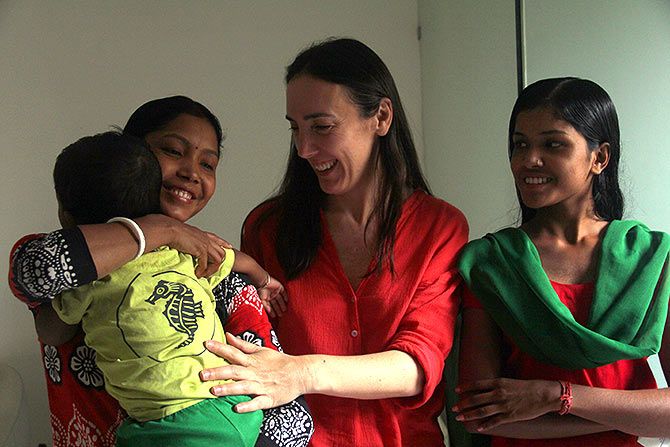
Filming the Barmans at home posed less of a challenge for Mylan logistically than shooting for Smile Pinki.
She and her small team were able to base themselves in Cooch Behar -- a non-descript town, by Mylan's estimation ("not high on my travel list"), where although they stayed in the "nicest hotel in town" lodging was basic, by any yardstick, and Internet speeds woefully slow -- and make forays into the countryside for the 10 hours of material shot.
Mylan, while acknowledging that people of various cultures are more alike than different, navigates new terrain carefully ("I can't say I have ever been afraid in India”) and, always, she has learnt, to do so like an American, aware of her limitations, rather than trying to be a local, taking careful heed of the advice of locals.
She believes in a non-intrusive kind of filmmaking.
For After My Garden Grows she operated with a translator and social worker and they sat patiently in on the day-to-day life of the Barmans, shooting whatever the translator directed as interesting.
It is a risky approach to filmmaking, because you are never entirely certain -- after you have painstakingly translated the footage and pieced it together -- if you have what it takes to make a film, but Mylan likes the gamble.
"The style of filmmaking I do (much like the style of Smile Pinki) is very much observational.
You are in the moment. In the trenches with the character and whatever happens in the days I am there is fair game for the film. So, there's no asking people (questions) although we don't roll nonstop. You just sort of pick your moments."
For a 10-minute film they shot for a week.
A lot of textured, multi-hued footage came from just happening to be in the right place at the right time.
"Making shorts are fun, now that I have a two-year old guy at home (her son Jack)," Mylan says.
"You can share them and see them in all different settings."
And they are good for propagating a good idea/message.
Vital was the initial time spent, before the shooting began, breaking the ice, chatting, telling them about herself, showing them pictures of Jack, who she had left behind in New York, and making the Barman family comfortable with having her around, so they proceed with their daily rhythms as if she were not -- or less -- of a guest in their midst.
Pulling that off with the Barman family was not too problematic.
Mylan recalls how much more tough it was with Pinki's family, who lived (and still do after a short stint in Lucknow because they missed the family and the quiet) in the deepest countryside of Uttar Pradesh, in Rampur Dahaba, more than an hour from Varanasi, way off the main road.
"I had a harder time building trust, which is such a fundamental part of it," Mylan says. "(They) have to buy into (the idea) and understand why I tell their story and want to participate… Pinki's mom, who had never ever left the village, was super uncomfortable.
"She had no concept of a foreigner. She could not wrap her head around who I was and why I was so different. She was really afraid of me."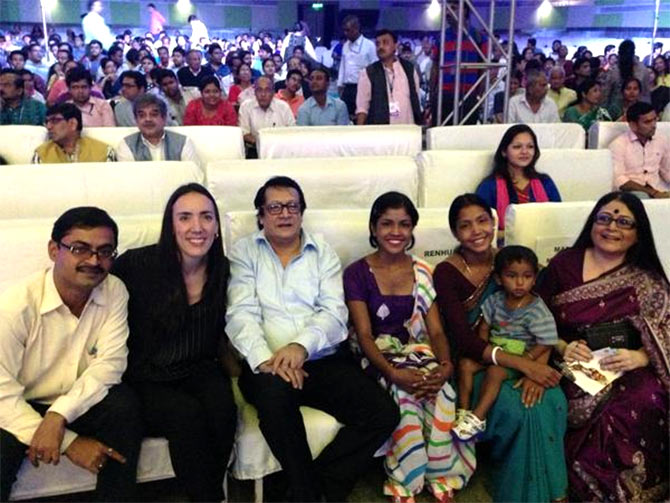
Monika as a subject is also quite different from Pinki and her kin. The teenager, in spite of living in an also fairly remote village, is better connected with the outside world. The village has a few televisions and the community congregates to watch programs on the common set located in the market.
Pinki's village did not have a electricity, says Mylan, let alone TVs or cell phones and when Mylan brought Pinki a box of sweets they buried it in the ground under a boulder to keep it cool.
Monika can receive calls on her basic Nokia (that she cannot charge at home, since the Barmans have no electricity) and has once visited the more 'modern' Cooch Behar.
She has some posters of Bengali film stars up in her home, has seen a few Hindi films, she tells you shyly, and likes Salman Khan and quite obviously Ranjit Mallick.
"Monika's village is not that isolated. I also think it is the difference of five years and technology and more information traveling," Mylan says.
But she feels that apart from the substantial chance of continuing her education, with the aim of eventually supporting her parents even if it means leaving home territory, Monika stands to gain much more out of having appeared in After My Garden Grows.
"With Pinki I was worried. She was so small. Taking people out of this somewhat desperate existence and throwing them in fancy hotels, planes and (then saying) 'Now go back'… Luckily, Pinki and her father really wanted to go back. When we had them in LA, Dr Subodh (who operated on her) was joking with her: 'Would you like a house here?’ when we were walking around Hollywood. She was, like, "No, it is too loud here'."
"When Pinki (and her father) came to the Oscars with us and met the Slumdog Millionaire people she had no idea why she should even be excited about them."
"With Monika and Kanika we have met all these powerhouse women (Naina Lal Kidwai, group general manager and country head, HSBC; the women radio jockeys of Radio One, Maneka Gandhi). I just think it has to have expanded Monika's sense of what women can do. Will she become any of those women? Probably not. But some equivalent of that. In Monika, and the other girls that gather in the film and hear from, there is definitely a quest and deep desire for education and access to a better, more interesting life." 
After My Garden Grows, with its lilting Bengali score, flows like a poem almost.
Timeless shots of rustic Bengal, stitched together, gently tells a fragilely upbeat story of a young life looking at change.
While Mylan was shooting her documentary she encountered another teenaged girl, Priyanka, the daughter of the owner of the hotel she was staying at in Cooch Behar, who was an Internet wiz and helped her connect to the Internet.
After a bit, the girl was no longer available to help because she was studying with her physics tutor.
The future of two girls, separated by a distance of just 35 minutes, differed by centuries.
"I thought, a half-hour distance between this 15 year old and this 16 year old… That short a distance for that great a contrast."
Mylan's After My Garden Grows attempts to close that yawning gap.

